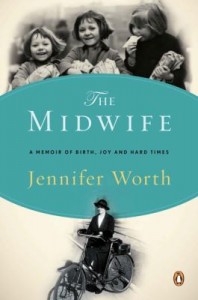Jennifer Worth’s The Midwife: A Memoir of Birth, Joy, and Hard Times chronicles the author’s experiences as a nurse and midwife amid the appalling conditions and unrelenting poverty of London’s East End in the 1950s. The book, which is part of a trilogy of bestsellers in the UK, is known mainly in America as the inspiration for the PBS show that “Downton Abbey” fans have turned to when they need their next costume-drama fix. Unlike that gorgeous Edwardian melodrama, Call the Midwife is gritty and grimy in its depiction of unrelenting poverty in crowded, hard-scrabble neighborhoods and slums.
Young Jenny is a nurse and a newly-qualified midwife from a well-educated and genteel middle-class family. Spurred on by the spirit of adventure (the reason she chose the profession in the first place, along with the cute uniforms nurses wore in those days), she accepts a position at Nonnatus House in the Poplar neighborhood of London’s East End. An agnostic and something of a bon vivant, she is dismayed to discover that what she took for a small, private hospital is actually a convent of nuns. The Sisters of St. Raymond Nonnatus serve the some of the poorest and roughest neighborhoods of the city, nursing the sick and attending at the homebirths of the vast majority of the local women (the working classes had an almost pathological fear and distrust of hospitals at that time).
Jenny is appalled at the conditions she encounters on her first nursing rounds — flats that are overcrowded, dirty, and unsafe; rampant disease; crime of every sort. She is equally puzzled by the nuns’ attitudes — by and large, they are indefatigable, joyful, and cheerful, radiating peace, calm, and purpose. Although Jenny finds the nuns’ way of life a curiosity when she first arrived at Nonnatus House (they adhere to a strict schedule of communal prayer, for example), the more she works alongside them, the more she grows to respect and love them. Their ability to serve charitably and cheerfully even in the most dire and disgusting of circumstances astonishes her more than anything else.
The oldest nun is nonagenarian Sister Monica Joan, who was disowned by her wealthy family when she did the unthinkable and told them she wanted to be not only a nurse but a nun to boot. Jenny eagerly asks her if it was her love for people that led her to give up her privileged life.
“‘Of course not,’ she snapped sharply, ‘How can you love ignorant, brutish people whom you don’t even know? Can anyone love filth and squalor? Or lice and rats? Who can love aching weariness, and carry on working, in spite of it? One cannot love these things. One can only love God, and through His grace come to love His people.’”
Jenny comes to Nonnatus House seeking an adventure and a challenge. She finds both, of course, but novelty is never sustaining. The physical and emotional strains inherent in her new life would be downright soul-crushing if there weren’t something more substantial to give her the strength to continue her work. She arrives as an agnostic (“er… that is, Methodist – I think”), but after marveling at what could possibly not only sustain the sisters through hardship but make them downright cheerful about it, she begins to wonder whether there might not be on to something with all their talk of God and faith.
The menial day-to-day tasks of an East End nurse are often horrible and disgusting. As Sister Monica Joan says, who can love disease and filth and squalor? Who can love suffering for its own sake? Yet these nuns and midwives carry on their work day after day, because they seek to love and serve God. Sister Monica Joan had no natural love for the poor, but she wants to please God, and trusts that he will give her the grace to do her work.
This was a fitting book to finish shortly before Lent. When I woke up on Ash Wednesday, I did so with a sense of dread for the hardship of fasting and abstaining from meat. I daresay hardly anyone goes through that day, or the whole season of Lent, without feeling at least a little miserable at times. We do not naturally love suffering. For me, the novelty of giving something up for Lent lasted, oh, about 20 minutes. By themselves, our Lenten sacrifices would be no more than a pointless and miserable exercise in self-deprivation and self-pity if they were undertaken for their own sake. Forty days is a long time–certainly longer than I can commit to something simply for the sake of a challenge (I have yet to finish a novena in the intended nine consecutive days). The Christian life is by nature a difficult one, and we are called to embrace hardship in various forms. But we don’t undertake suffering for its own sake. Just as Sister Monica Joan only learned to endure her revolting work by doing it out of love for God, so we in our Lenten sacrifices can only derive joy from them if we undertake them out of a desire to deny ourselves so that we may make more room in our hearts for God.












